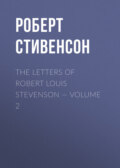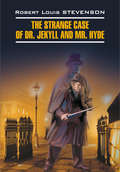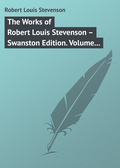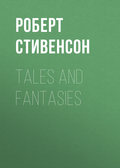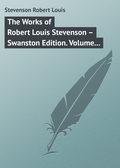
Роберт Льюис Стивенсон
The Works of Robert Louis Stevenson – Swanston Edition. Volume 23
To Sidney Colvin
[Edinburgh] February 8, 1875.
MY DEAR COLVIN, – Forgive my bothering you. Here is the proof of my second Knox. Glance it over, like a good fellow, and if there’s anything very flagrant send it to me marked. I have no confidence in myself; I feel such an ass. What have I been doing? As near as I can calculate, nothing. And yet I have worked all this month from three to five hours a day, that is to say, from one to three hours more than my doctor allows me; positively no result.
No, I can write no article just now; I am pioching, like a madman, at my stories, and can make nothing of them; my simplicity is tame and dull – my passion tinsel, boyish, hysterical. Never mind – ten years hence, if I live, I shall have learned, so help me God. I know one must work, in the meantime (so says Balzac) comme le mineur enfoui sous un éboulement.
J’y parviendrai, nom de nom de nom! But it’s a long look forward. – Ever yours,
R. L. S.
To Mrs. Sitwell
As the spring advanced Stevenson had again been much out of sorts, and had gone for a change, in the company of Mr. R. A. M. Stevenson, on his first visit to the artist haunts of Fontainebleau which were afterwards so much endeared to him.
[Barbizon, April 1875.]
MY DEAR FRIEND, – This is just a line to say I am well and happy. I am here in my dear forest all day in the open air. It is very be – no, not beautiful exactly, just now, but very bright and living. There are one or two song birds and a cuckoo; all the fruit-trees are in flower, and the beeches make sunshine in a shady place. I begin to go all right; you need not be vexed about my health; I really was ill at first, as bad as I have been for nearly a year; but the forest begins to work, and the air, and the sun, and the smell of the pines. If I could stay a month here, I should be as right as possible. Thanks for your letter. – Your faithful
R. L. S.
To Mrs. Sitwell
[Swanston, Tuesday, April 1875.]
MY DEAR FRIEND, – I have been so busy, away to Bridge of Allan with my father first, and then with Simpson and Baxter out here from Saturday till Monday. I had no time to write, and, as it is, am strangely incapable. Thanks for your letter. I have been reading such lots of law, and it seems to take away the power of writing from me. From morning to night, so often as I have a spare moment, I am in the embrace of a law book – barren embraces. I am in good spirits; and my heart smites me as usual, when I am in good spirits, about my parents. If I get a bit dull, I am away to London without a scruple; but so long as my heart keeps up, I am all for my parents.
What do you think of Henley’s hospital verses?19 They were to have been dedicated to me, but Stephen wouldn’t allow it – said it would be pretentious.
Wednesday.– I meant to have made this quite a decent letter this morning, but listen. I had pain all last night, and did not sleep well, and now am cold and sickish, and strung up ever and again with another flash of pain. Will you remember me to everybody? My principal characteristics are cold, poverty, and Scots Law – three very bad things. Oo, how the rain falls! The mist is quite low on the hill. The birds are twittering to each other about the indifferent season. O, here’s a gem for you. An old godly woman predicted the end of the world, because the seasons were becoming indistinguishable; my cousin Dora objected that last winter had been pretty well marked. “Yes, my dear,” replied the soothsayeress; “but I think you’ll find the summer will be rather co-amplicated.” – Ever your faithful
R. L. S.
To Mrs. Sitwell
The rehearsals were those of Shakespeare’s Twelfth Night for amateur theatricals at Professor Fleeming Jenkin’s, in which Stevenson played the part of Orsino.
[Edinburgh, April 1875] Saturday.
I am getting on with my rehearsals, but I find the part very hard. I rehearsed yesterday from a quarter to seven, and to-day from four (with interval for dinner) to eleven. You see the sad strait I am in for ink. —À demain.
Sunday.– This is the third ink-bottle I have tried, and still it’s nothing to boast of. My journey went off all right, and I have kept ever in good spirits. Last night, indeed, I did think my little bit of gaiety was going away down the wind like a whiff of tobacco smoke, but to-day it has come back to me a little. The influence of this place is assuredly all that can be worst against one; mais il faut lutter. I was haunted last night when I was in bed by the most cold, desolate recollections of my past life here; I was glad to try and think of the forest, and warm my hands at the thought of it. O the quiet, grey thickets, and the yellow butterflies, and the woodpeckers, and the outlook over the plain as it were over a sea! O for the good, fleshly stupidity of the woods, the body conscious of itself all over and the mind forgotten, the clean air nestling next your skin as though your clothes were gossamer, the eye filled and content, the whole MAN HAPPY! Whereas here it takes a pull to hold yourself together; it needs both hands, and a book of stoical maxims, and a sort of bitterness at the heart by way of armour. – Ever your faithful
R. L. S.
Wednesday.– I am so played out with a cold in my eye that I cannot see to write or read without difficulty. It is swollen horrible; so how I shall look as Orsino, God knows! I have my fine clothes tho’. Henley’s sonnets have been taken for the Cornhill. He is out of hospital now, and dressed, but still not too much to brag of in health, poor fellow, I am afraid.
Sunday.– So. I have still rather bad eyes, and a nasty sore throat. I play Orsino every day, in all the pomp of Solomon, splendid Francis the First clothes, heavy with gold and stage jewellery. I play it ill enough, I believe; but me and the clothes, and the wedding wherewith the clothes and me are reconciled, produce every night a thrill of admiration. Our cook told my mother (there is a servants’ night, you know) that she and the housemaid were “just prood to be able to say it was oor young gentleman.” To sup afterwards with these clothes on, and a wonderful lot of gaiety and Shakespearean jokes about the table, is something to live for. It is so nice to feel you have been dead three hundred years, and the sound of your laughter is faint and far off in the centuries. – Ever your faithful
Robert Louis Stevenson.
To Mrs. Sitwell
[Edinburgh, April 1875.]
Wednesday.– A moment at last. These last few days have been as jolly as days could be, and by good fortune I leave to-morrow for Swanston, so that I shall not feel the whole fall back to habitual self. The pride of life could scarce go further. To live in splendid clothes, velvet and gold and fur, upon principally champagne and lobster salad, with a company of people nearly all of whom are exceptionally good talkers; when your days began about eleven and ended about four – I have lost that sentence; I give it up; it is very admirable sport, any way. Then both my afternoons have been so pleasantly occupied – taking Henley drives. I had a business to carry him down the long stair, and more of a business to get him up again, but while he was in the carriage it was splendid. It is now just the top of spring with us. The whole country is mad with green. To see the cherry-blossom bitten out upon the black firs, and the black firs bitten out of the blue sky, was a sight to set before a king. You may imagine what it was to a man who has been eighteen months in an hospital ward. The look of his face was a wine to me. He plainly has been little in the country before. Imagine this: I always stopped him on the Bridges to let him enjoy the great cry of green that goes up to Heaven out of the river beds, and he asked (more than once) “What noise is that?” – “The water.” – “O!” almost incredulously; and then quite a long while after: “Do you know the noise of the water astonished me very much?” I was much struck by his putting the question twice; I have lost the sense of wonder of course; but there must be something to wonder at, for Henley has eyes and ears and an immortal soul of his own.
I shall send this off to-day to let you know of my new address – Swanston Cottage, Lothianburn, Edinburgh. Salute the faithful in my name. Salute Priscilla, salute Barnabas, salute Ebenezer – O no, he’s too much, I withdraw Ebenezer; enough of early Christians. – Ever your faithful
Robert Louis Stevenson.
To Sidney Colvin
[Edinburgh, May or June 1875.]
I say, we have a splendid picture here in Edinburgh. A Ruysdael of which one can never tire: I think it is one of the best landscapes in the world: a grey still day, a grey still river, a rough oak wood on one shore, on the other chalky banks with very complicated footpaths, oak woods, a field where a man stands reaping, church towers relieved against the sky and a beautiful distance, neither blue nor green. It is so still, the light is so cool and temperate, the river woos you to bathe in it. O I like it!
I say, I wonder if our Scottish Academy’s exhibition is going to be done at all for Appleton or whether he does not care for it. It might amuse me, although I am not fit for it. Why and O why doesn’t Grove publish me? – Ever yours,
R. L. Stevenson.
To Sidney Colvin
I was at this time, if I remember rightly, preparing some lectures on Hogarth for a course at Cambridge.
[Swanston, June 1875.]
MY DEAR COLVIN, – I am a devil certainly; but write I cannot. Look here, you had better get hold of G. C. Lichtenberg’s Ausfürliche Erklarung der Hogarthischen Kupferstiche: Göttingen, 1794 to 1816 (it was published in numbers seemingly). Douglas the publisher lent it to me: and tho’ I hate the damned tongue too cordially to do more than dip into it, I have seen some shrewd things. If you cannot get it for yourself, (it seems scarce), I dare say I could negotiate with Douglas for a loan. This adorable spring has made me quite drunken, drunken with green colour and golden sound. We have the best blackbird here that we have had for years; we have two; but the other is but an average performer. Anything so rich and clear as the pipe of our first fiddle, it never entered into the heart of man to fancy. How the years slip away, Colvin; and we walk little cycles, and turn in little abortive spirals, and come out again, hot and weary, to find the same view before us, the same hill barring the road. Only, bless God for it, we have still the same eye to see with, and if the scene be not altogether unsightly, we can enjoy it whether or no. I feel quite happy, but curiously inert and passive, something for the winds to blow over, and the sun to glimpse on and go off again, as it might be a tree or a gravestone. All this willing and wishing and striving leads a man nowhere after all. Here I am back again in my old humour of a sunny equanimity; to see the world fleet about me; and the days chase each other like sun patches, and the nights like cloud-shadows, on a windy day; content to see them go and no wise reluctant for the cool evening, with its dew and stars and fading strain of tragic red. And I ask myself why I ever leave this humour? What I have gained? And the winds blow in the trees with a sustained “Pish“! and the birds answer me in a long derisive whistle.
So that for health, happiness, and indifferent literature, apply to – Ever yours,
R. L. S.
To Mrs. Sitwell
“Burns” means the article on Burns which R. L. S. had been commissioned to write for the Encyclopædia Britannica. The “awfully nice man” was the Hon. J. Seed, formerly Secretary to the Customs and Marine Department of New Zealand; and it was from his conversation that the notion of the Samoan Islands as a place of refuge for the sick and world-worn first entered Stevenson’s mind, to lie dormant (I never heard him speak of it) and be revived thirteen years later.
[Edinburgh, June 1875.]
Simply a scratch. All right, jolly, well, and through with the difficulty. My father pleased about the Burns. Never travel in the same carriage with three able-bodied seamen and a fruiterer from Kent; the A. – B.’s speak all night as though they were hailing vessels at sea; and the fruiterer as if he were crying fruit in a noisy market-place – such, at least, is my funeste experience. I wonder if a fruiterer from some place else – say Worcestershire – would offer the same phenomena? insoluble doubt.
R. L. S.
Later.– Forgive me, couldn’t get it off. Awfully nice man here to-night. Public servant – New Zealand. Telling us all about the South Sea Islands till I was sick with desire to go there: beautiful places, green for ever; perfect climate; perfect shapes of men and women, with red flowers in their hair; and nothing to do but to study oratory and etiquette, sit in the sun, and pick up the fruits as they fall. Navigator’s Island is the place; absolute balm for the weary. – Ever your faithful friend,
R. L. S.
To Mrs. Sitwell
The examination for the Bar at Edinburgh was approaching. Fontainebleau is the paper called Forest Notes, afterwards printed in the Cornhill Magazine. The church is Glencorse Church in the Pentlands, to the thoughts of which Stevenson reverted in his last days with so much emotion (see Weir of Hermiston, chap. v.).
[Swanston. End of June 1875.]
Thursday.– This day fortnight I shall fall or conquer. Outside the rain still soaks; but now and again the hilltop looks through the mist vaguely. I am very comfortable, very sleepy, and very much satisfied with the arrangements of Providence.
Saturday – no, Sunday, 12.45. – Just been – not grinding, alas! – I couldn’t – but doing a bit of Fontainebleau. I don’t think I’ll be plucked. I am not sure though – I am so busy, what with this d – d law, and this Fontainebleau always at my elbow, and three plays (three, think of that!) and a story, all crying out to me, “Finish, finish, make an entire end, make us strong, shapely, viable creatures!” It’s enough to put a man crazy. Moreover, I have my thesis given out now, which is a fifth (is it fifth? I can’t count) incumbrance.
Sunday.– I’ve been to church, and am not depressed – a great step. I was at that beautiful church my petit poëme en prose was about. It is a little cruciform place, with heavy cornices and string course to match, and a steep slate roof. The small kirkyard is full of old gravestones. One of a Frenchman from Dunkerque – I suppose he died prisoner in the military prison hard by – and one, the most pathetic memorial I ever saw, a poor school-slate, in a wooden frame, with the inscription cut into it evidently by the father’s own hand. In church, old Mr. Torrence preached – over eighty, and a relic of times forgotten, with his black thread gloves and mild old foolish face. One of the nicest parts of it was to see John Inglis, the greatest man in Scotland, our Justice-General, and the only born lawyer I ever heard, listening to the piping old body, as though it had all been a revelation, grave and respectful. – Ever your faithful
R. L. S.
To Mrs. Sitwell
[Edinburgh, July 15, 1875.]
Passed.
Ever your
R
L
S
IV
ADVOCATE AND AUTHOR
EDINBURGH – PARIS – FONTAINEBLEAU
July 1875-July 1879
Having on the 14th of July 1875 passed with credit his examination for the Bar at Edinburgh, Stevenson thenceforth enjoyed whatever status and consideration attaches to the title of Advocate. But he made no serious attempt to practise, and by the 25th of the same month had started with Sir Walter Simpson for France. Here he lived and tramped for several weeks among the artist haunts of Fontainebleau and the neighbourhood, occupying himself chiefly with studies of the French poets and poetry of the fifteenth century, which afterwards bore fruit in his papers on Charles of Orleans and François Villon. Thence he travelled to join his parents at Wiesbaden and Homburg. Returning in the autumn to Scotland, he made, to please them, an effort to live the ordinary life of an Edinburgh advocate – attending trials and spending his mornings in wig and gown at the Parliament House. But this attempt was before long abandoned as tending to waste of time and being incompatible with his real occupation of literature. Through the next winter and spring he remained in Edinburgh, except for a short winter walking tour in Ayrshire and Galloway, and a month spent among his friends in London. In the late summer of 1876, after a visit to the West Highlands, he made the canoe trip with Sir Walter Simpson which furnished the subject of the Inland Voyage, followed by a prolonged autumn stay at Grez and Barbizon. The life, atmosphere, and scenery of these forest haunts had charmed and soothed him, as we have seen, since he was first introduced to them by his cousin, Mr. R. A. M. Stevenson, in the spring of 1875. An unfettered, unconventional, open-air existence, passed face to face with nature and in the company of congenial people engaged, like himself, in grappling with the problems and difficulties of an art, had been what he had longed for most consistently through all the agitations of his youth. And now he had found just such an existence, and with it, as he thought, peace of mind, health, and the spirit of unimpeded work.
But peace of mind was not to be his for long. What indeed awaited him in the forest was something different and more momentous: it was his fate: the romance which decided his life, and the companion whom he resolved to make his own at all hazards. But of this hereafter. To continue briefly the annals of the time: the year 1877 was again spent between Edinburgh, London, the Fontainebleau region, and several different temporary abodes in the artists’ and other quarters of Paris; with an excursion in the company of his parents to the Land’s End in August. In 1878 a similar general mode of life was varied by a visit with his parents in March to Burford Bridge, where he made warm friends with a senior to whom he had long looked up from a distance, Mr. George Meredith; by a spell of secretarial work under Professor Fleeming Jenkin, who was serving as a juror on the Paris Exhibition; and lastly, by the autumn tramp through the Cévennes, afterwards recounted with so much charm in Travels with a Donkey. The first half of 1879 was again spent between London, Scotland, and France.
During these four years, it should be added, Stevenson’s health was very passable. It often, indeed, threatened to give way after any prolonged residence in Edinburgh, but was generally soon restored by open-air excursions (during which he was capable of fairly vigorous and sustained daily exercise), or by a spell of life among the woods of Fontainebleau. They were also the years in which he settled for good into his chosen profession of letters. He worked rather desultorily for the first twelve months after his call to the Bar, but afterwards with ever-growing industry and success, winning from the critical a full measure of recognition, though relatively little, so far, from the general public. In 1875 and 1876 he contributed as a journalist, though not frequently, to the Academy and Vanity Fair, and in 1877 more abundantly to London, a weekly review founded by Mr. Glasgow Brown, an acquaintance of Edinburgh Speculative days, and carried on, after the failure of that gentleman’s health, by Mr. Henley. But he had no great gift or liking for journalism, or for any work not calling for the best literary form and finish he could give. Where he found special scope for such work was in the Cornhill Magazine under the editorship of Mr. Leslie Stephen. Here he continued his critical papers on men and books, already begun in 1874 with Victor Hugo, and began in 1876 the series of papers afterwards collected in Virginibus Puerisque. They were continued in 1877, and in greater number throughout 1878. His first published stories appeared as follows: —A Lodging for the Night, Temple Bar, October 1877; The Sire de Malétroit’s Door, Temple Bar, January 1878; and Will o’ the Mill, Cornhill Magazine, January 1878. In May 1878 followed his first travel book, The Inland Voyage, containing the account of his canoe trip from Antwerp to Grez. This was to Stevenson a year of great and various productiveness. Besides six or eight characteristic essays of the Virginibus Puerisque series, there appeared in London the set of fantastic modern tales called the New Arabian Nights, conceived and written in an entirely different key from any of his previous work, as well as the kindly, sentimental comedy of French artist life, Providence and the Guitar; and in the Portfolio the Picturesque Notes on Edinburgh, republished at the end of the year in book form. During the autumn and winter of this year he wrote Travels with a Donkey in the Cévennes, and was much and eagerly engaged in the planning of plays in collaboration with Mr. Henley; of which one, Deacon Brodie, was finished in the spring of 1879. In the same spring he drafted in Edinburgh, but afterwards laid by, four chapters on ethics, a study of which he once spoke as being always his “veiled mistress,” under the name of Lay Morals.
But abounding in good work as this period was, and momentous as it was in regard to Stevenson’s future life, it is a period which figures but meagrely in his correspondence, and in this book must fill disproportionately little space. Without the least breach of friendship, or even of intimate confidence on occasion, Stevenson had begun, as was natural and necessary, to wean himself from his entire dependence on his friend and counsellor of the last two years; to take his life more into his own hands; and to intermit the regularity of his correspondence with her. A few new correspondents appear; but to none of us in these days did he write more than scantily. Partly his growing absorption by the complications of his life and the interests of his work left him little time or inclination for letter-writing; partly his greater freedom of movement made it unnecessary. On his way backwards and forwards between Scotland and France, his friends in London had the chance of seeing him much more frequently than of yore. He avoided formal and dress-coated society; but in the company of congenial friends, whether men or women, and in places like the Savile Club (his favourite haunt), he was as brilliant and stimulating as ever, and however acute his inward preoccupations, his visits were always a delight.



